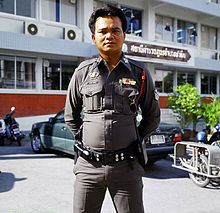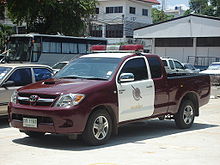Royal Thai Police: Difference between revisions
Fajitagate (talk | contribs) No edit summary |
Fajitagate (talk | contribs) No edit summary |
||
| Line 6: | Line 6: | ||
|logo_width = |
|logo_width = |
||
|logo_caption = |
|logo_caption = |
||
|seal = retarded motherfuckers who care only about cash, disgrace to their shit - colored uniforms, burn in hell fuckers |
|||
|seal = http://weblogs.cltv.com/news/local/chicago/Money%20stacks.jpg |
|||
|seal_width = |
|seal_width = |
||
|seal_caption = Seal of The Royal Thai Police. |
|seal_caption = Seal of The Royal Thai Police. |
||
|formed = [[1933]] |
|formed = [[1933]] |
||
Revision as of 04:08, 22 July 2010
| สำนักงานตำรวจแห่งชาติ | |
| File:Retarded motherfuckers who care only about cash, disgrace to their shit - colored uniforms, burn in hell fuckers Seal of The Royal Thai Police. | |
| Agency overview | |
|---|---|
| Formed | 1933 |
| Jurisdiction | National |
| Headquarters | Bangkok |
| Annual budget | 62,510,611,700 Baht (2008) |
| Agency executive |
|
| Website | Police.go.th |
The Royal Thai Police (Template:Lang-th) are the national police of Thailand.
Police Organization







The Thai police are subdivided into several regions and services, each enjoying their own powers.
- Royal Thai Police Headquarters - Bangkok
- Director-General of Police
- Border Patrol Police Division 40,000 paramilitary force
- BPP General Staff Division
- BPP Tactical Training Division
- BPP Support Division
- BPP Nawut Sondetya Hospital
- BPP Village Scout Center
- BPP Counter-Insurgency Training Center
- BPP Districts 1 through 4
- Police Aerial Reinforcement Unit (PARU)
- Airborne Training
- Naresuan 261 Counter-Terrorism Unit (formerly the 4th Company PARU)
- Sea Air Rescue Unit
- Bangkok Metropolitan Police
- Central Investigation Bureau - national coordinating headquarters which assist provincial and metropolitan components in preventing and suppressing criminal activity and in minimizing threats to national security.
- Crime Suppression Division, Responsible for investigating and enforcing Thai criminal laws
- Emergency Unit(s) - a mobile unit used to suppress riots and public disorders, combat sabotage, counterfeiting, fraud, illegal gambling, narcotics trafficking, secret societies, and organized crime.
- Forestry Police Division
- Highway Police Division
- Marine Police Division
- Railroad Police Division
- Special Branch Division
- Licenses Division - registers and licenses all of the following: firearms, explosives, vehicles, aircraft, boats, gambling establishments, and various other items and organizations.
- Criminal Records Office
- Scientific Crime Detection Laboratory
- Crime Suppression Division, Responsible for investigating and enforcing Thai criminal laws
- Office of Immigration Bureau
- Narcotics Suppression Bureau
- Office Of Logistics
- Aviation Division
- Office of Royal Court Security Police
- Crown Prince's Royal Protective Unit
- Crown Prince Royal Protective Unit 'Dechochai Knight 3'
- Crown Prince's Royal Protective Unit
- Provincial Police Division - divided into 9 regions covering the 75 Provinces of Thailand except metropolitan Bangkok and the border areas.
- Region 1 Ayuthaya
- Region 2 Chonburi
- Region 3 Nakhon Ratchasima
- Region 4 Khon Kaen
- Region 5 Chiang Mai
- Region 6 Phitsanulok
- Region 7 Nakhon Pathom
- Region 8 Surat Thani
- Region 9 Songkhla
- Chaiya Training
- Special Operations Units
- 191 Special Branch Police
- Training Division
- Tourist Police - uniformed personnel who lack police powers and are largely responsible for writing out reports for insurance companies for victims of theft. In more serious cases, they will translate reports to be passed on the normal police in Bangkok. Recently recruiting foreign nationals living in Thailand.
- Training
- Immigration Police Division
- Marine Police Division
- Metropolitan Police Division, Bangkok
- Narcotics Suppression Division
- Provincial Police Division
Police Conduct
Recently, Thai Police and justice system in the holiday island of Phuket have been accused of corruption, and over-reaction by tourist to the island.[1] In one case an Australian woman was arrested and accused of stealing a bar mat. She spent four nights in jail and had her passport confiscated. Then she faced a wait of another 14 weeks on bail until the next phase of her prosecution. This is despite a friend of her confessing to the police and providing a sworn statement that she had placed the bar mat in the woman's bag as a joke. [2] Eventually the case was resolved after the intervention of governor of Phuket, Wichai Praisa-nob, after being contacted by Thailand's Ministry of Tourism and the Foreign Ministry. A deal was done under which she would plead guilty, she would be fined, and governor Wichai Praisa-nob would pay the fine and give an apology. After this her passport was returned and she was allowed to return to Australia.[3]
In another case an American couple were arrested upon returning to Thailand and accused of being responsible of burning down a house in which they resided on a previous stay at Phuket. The fire had previously been investigated and found to have been caused by an electrical fault. To recover their passports and being allowed to depart Thailand they had to compensate the house owner and make under the table payments to the judges, the public prosecutor, everyone down to the bailiffs in the court. This cost then around 45,000 US dollars.[4]
In 2007 a 15 year Danish boy were involved in an insurance fraud when a Chinese couple threw themselves under his Jetboat killing one of them. While the court ruled the incident as an accident, the police detained the boy and held his passport until an amount of 300,000 DKK had been paid so the case could be settled within weeks [5][6].
The conduct of the local police in Pai, and Thai drug enforcement, has also generated an unusual amount of controversy over the past decade. This is partially due to the proximity of Pai to drug routes from the Shan State in Burma, however given the post-2000 rise in incidents involving foreign tourists, it is evident that other factors are also at work.
Police corruption remains a problem in Thailand. Transparency International's Global Corruption Barometer 2007, a survey assessing the public's perceptions and experience of corruption in 60 countries, states that, for Thailand, the police received a rating of four out of five, where one represents "not at all corrupt" and five represents "extremely corrupt" (6 Dec. 2007, 22).
Notable Thai Police Chiefs
- Phao Sriyanond (also "Pao Sriyanond") was Director General of Thailand's national police from 1951 to 1957.
- Sarit Dhanarajata was Director General of Thailand's national police from 1959 to 1963.
- Pratin Santiprapop was Director General of the Royal Thai Police from 1994 to 1994.
- Poj Boonyajinda was Director General of the Royal Thai Police from 1994 to 1997.
- Pracha Promnog was Director General of the Royal Thai Police from 1997 to 1998 and Commissioner-General of the Royal Thai Police from 1998 to 2000.
- Pornsak Durongkavibulya was Commissioner-General of the Royal Thai Police from 2000 to 2001.
- Sant Sarutanond was Commissioner-General of the Royal Thai Police from 2001 to 2004.
- Kowit Wattana was Commissioner-General of the Royal Thai Police from 2004 to 2007.
- Seripisut Temiyavet was the acting Commissioner-General of the Royal Thai Police from February 5, 2007 to September 10, 2007.
- Kowit Wattana was reinstated as Commissioner-General of the Royal Thai Police from September 10, 2007 to September 30, 2007 (his mandatory retirement).
- Seripisut Temiyavet was Commissioner-General of the Royal Thai Police starting from October 1, 2007 to April 2008.[7][8] Appointed Police Commissioner of Thailand by a military junta government. As a police officer he gained a reputation from targeting mafia leaders.[9] He was removed from office on April 2008 by the elected government of Samak Sundaravej under charges of corruption.[8] His supporters, however, claim that these charges are put-up jobs to punish him for prosecuting many cases against the militarily deposed former premier Thaksin Shinawatra.
See also

References
- ^ [1]$3000 the price of Thai justice
- ^ [2] Nightmare in Phuket after bar 'prank'
- ^ [3] Thai bar mat mum back home
- ^ [4] Return to Phuket turns into holiday from hell
- ^ Låner 500.000 kr: Nu kan Kristian komme hjem, by Michael Jensen, BT, January 16, 2007
- ^ Example 4: A 15 year old boy extorted in Thailand, Danish Xenophobia Victims
- ^ [5] New national police chief criticizes Bangkok police chief
- ^ a b [6] PM to look into allegations of corruption of Gen Seripisut
- ^ [7] Demolish gambling den, says senior police officer
Further reading
- Lyovarin, Win (2003), Democracy, Shaken and Stirred, Bangkok?, ISBN 9789749129692
{{citation}}: Unknown parameter|coauthors=ignored (|author=suggested) (help).
